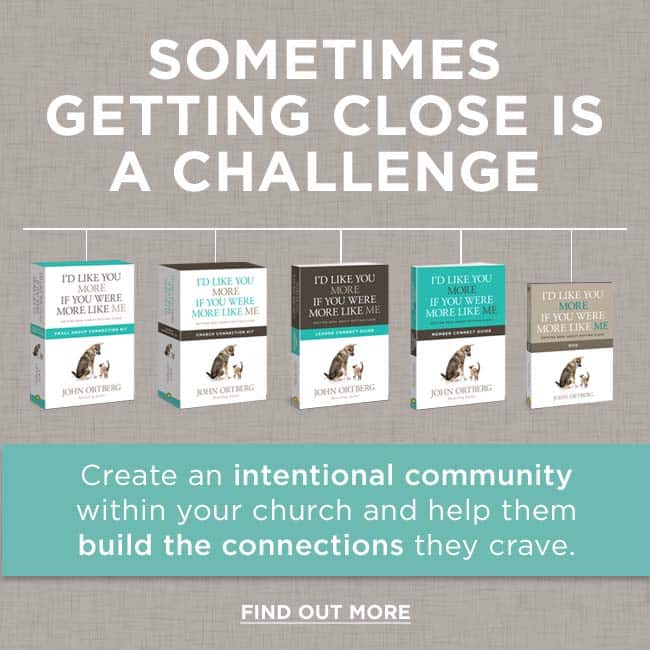We all crave deeper connections to God and other people, and it’s God’s desire that we draw close to Him. The reality is that with our busy lives and crazy schedules, these deep connections are not easy to nurture. In this video recorded for our Children’s and Family Ministry events, Pastor John Ortberg shares how you can develop a better, healthier relationship with God and with your team.
Hey, Children and Family Ministry Leaders, I can’t tell you how much I appreciate everything you do to disciple kids and families at your churches.
I want to talk to you today about the way that you can build stronger connections with God for yourself and stronger connections with other people. An outflow of these intimate connections will actually be better, healthier disciples in your church.
What is intimacy?
I’ve written several books, and my newest one is called, I’d Like You More If You Were More Like Me. It really began for me with words from a huge influence in my life, a man named Dallas Willard. Dallas taught philosophy at the University of Southern California. He was a great thinker about faith and God in life. And he was talking one day about the nature of intimacy. He started by saying that your life essentially consists of a flow of experiences. You’re way more than just your body. You’re way more than flesh or tissue. Your life really is a series of conscious experiences.
I live in the Bay area now, and—I have to tell you—I love it. San Francisco is such a stimulating place. I don’t know how many of you ever have been there, but to go over the Golden Gate Bridge, to walk through Muir Woods, to see the redwoods, to drive down Big Sur, to go to Yosemite (I was there last week), and to the water is unbelievable.
Intimacy is a shared experience.
-Dallas Willard
We treasure experiences. So your life is basically experiences—a flow of thoughts, feelings, sensations and decisions. That is your life. And then Dallas said, “Intimacy is shared experience.” Dallas had a fabulous way of getting tremendous clarity about what words mean. Words that we all throw around, but often we haven’t through deeply. Intimacy is shared experience, and that’s why we crave it so deeply.

We crave intimacy
We are hardwired for emotional connection to other people.
That’s why there was that first great “not good” in the Bible. After God creates, it’s all so good—and then it’s not good for a man, a human being, to be alone. It’s not good to have a ceaseless flow of experiences that cannot be shared. For me—really for all of us—what tremendously matters in life is relationships. We are hardwired for emotional connection to other people. We want to be known. We crave being loved. I want to be accepted by somebody who is completely aware of whatever gifts I have, whatever flaws I have—and yet wants to be with me anyway.
The very choice to pursue intimacy—to reveal my weakness and my neediness—actually requires great strength.
In short, we crave intimacy. This is why you do what you do. Intimacy can also make us feel needy, or—worse—it can reveal our neediness. Generally speaking, we don’t like to feel needy. We like to think of ourselves as strong. Ironically, the very choice to pursue intimacy—to reveal my weakness and my neediness—actually requires great strength.
We fear intimacy
Now many of us fear intimacy because, deep down, we think we don’t deserve it. We are afraid our deficits and flaws are bound to emerge—and it will hurt even more to lose intimacy, than to never have had it at all. Anytime we let somebody in, we run the risk of being hurt or rejected, so we tend to avoid it. The irony of course is, that we deeply desire intimacy.
We want to be loved, to be liked, to be celebrated, to have somebody who accepts us no matter what. We want to have great friendships. We want to have people to turn to when crisis hits. We want to have somebody trustworthy in whom we can safely confide our secrets. And it’s not just that we want intimacy, we were made for it.
Whether you are a man or a woman. Whether you are the life of the party, a lamp shade wearing crazy animal or a wallflower. Whether you’re a Baptist or an Episcopalian. Whether you’re a thinker or a feeler, or a category not yet known to social science—you were made for connection. You were made for relationships. You were made for intimacy. It is an inevitable hunger of human beings to be able to connect. To connect is another way of talking about that intimacy with people, often conjures up thoughts about romance or marriage or sex or something like that.
We’re all made for intimacy with God and for each other, and we’re miserable and lonely without it.
Part of what I talk about a lot in I’d Like You More If You Were More Like Me, is about helping clarify for people that intimacy is not the same thing as sex. You can have intimacy without having sex. You could have sex without having intimacy. Intimacy is shared experience. And guys, it’s part of why it’s so important for churches to talk about connection and intimacy, especially for you who work with kids and with families. Because we’re all made for intimacy with God and for each other, and we’re miserable and lonely without it.
And here’s the thing. Unfortunately, way too often, churches—which should be the first place where people experience deep, honest, authentic connection—become the last place they do. Church, where it should be the last place that we hide, instead becomes the first place. The presence of hidden, unshared, experience actually creates isolation and alienation.
Intimacy is learned skill. It is not reserved for feelers.
If somebody in the church community is living with deep doubts, and they feel like they can’t share them, that kills community in a church. A lot of what my book gets into is answer the questions of “how do you invite somebody into intimacy?” and “how do you learn about intimacy?” This is critical, intimacy is learned skill. It is not reserved for feelers.
You may know Myers-Briggs’ work on temperaments. There are thinkers, and there are feelers. And sometimes people think that intimacy is only for feelers. It is not. You thinkers, you are necessary, you’re part of the image of God. It might look different for you than it will with a feeler.

We have three kids. Two of our kids are very strong feelers. The third kid would not know a feeling if it hit them upside the head. The way that we have to connect is quite different. With both of our girls, if I take them out to a restaurant and just look them in the eye and say, “How are you doing? What’s happening in your soul? What’s going on in your heart? Pour everything out to me.” I’m earning points with them. They love that. If I do that with our son, he will run the other direction. I am losing massive piles of chips if I do that with him.
I learned a long time ago that one of the best places to have a conversation with our son is in a car. Anybody want to guess why? You don’t have to make eye contact in a car! You can’t get away, but you’re not forced to look at somebody. With both of our girls, eye contact is something they love. For our son, the freedom not to have to do that—not to have to talk—is what touches his soul and opens him up to be able to enter into intimacy.
Intimacy is shared experience, not forced experience.
This is where the word “shared” is so important. Intimacy is shared experience, not forced experience. We all know that sensation. If somebody says, “I’d like for you to read this book,” or, “I’d like for you to see this movie.” And you do that. But the other person is putting pressure on you. “I liked it, so you have to like it, or I’ll be disappointed and reject you.”
Simply being together in the same room is not the same thing as experiencing intimacy.
Then, instead of creating intimacy, it actually creates distance. Because it does not honor the personhood, and particularly the will of the other person. And churches are places where we need to honor personhood. Children need to learn to do this. Intimacy is this wonderful activity between persons where we can learn to honor the other’s will. Simply being together in the same room is not the same thing as experiencing intimacy.
My wife Nancy’s a California girl. I grew up in Rockford, Illinois. When Nancy and I got married, we were going to go on our honeymoon. I knew we’d want to have a honeymoon that would be extremely intimate. And so, of course, I took her to Door County, Wisconsin. Which is a fabulous place. And I have been paying for that choice for 34 years.
Nancy and I grew up in real different kinds of families. We’ve got a great metaphor for this. When our oldest daughter turned 18, she was dealing with a lot of anxiety. She went to see a therapist. We were in the process of moving from Chicago to California. And she also was leaving what had been our home in Chicago to attend college in California—Westmont College in Santa Barbara. And my wife and I thought, “Well, we’re moving to California, she’s going to go to California to go to college, and this will be great.”
But it was not great for her at all. She actually felt way more anxious because we were leaving the place that had been home for her. And her therapist gave her this wonderful analogy. Her therapist said, “Laura, it’s like your life is a little boat. You’ve been given this little boat and it’s you. And you’re setting out in your little boat into the world. But your dock is going away—you’re losing your dock.” See the boat in this analogy is your individuality. The dock is your home and your family.

And when Laura told Nancy and me about this, we both loved that analogy and applied it to ourselves. Nancy grew up an only child. Her dad was an alcoholic, and so there could be patterns of distance in the family. And Laura said, “I felt like I never got a dock. I had a boat right away, but I never had a dock.” My family was kind of the opposite. My family when I was growing up was really close. But we didn’t always do really well with things like independence or conflict or individual identity.
I said, “Man, I had a great dock. I never had a boat—I never knew I had a boat.” My family experienced a kind of deep closeness—this will be true in some of your churches. A lot of times, evangelical families will have a certain kind of closeness. And it’s wonderful, and I’m real grateful for it. But some deficits can go along with that in terms of not dealing well with conflict or separation and so on.
I thought I knew what intimacy was, because I knew what it was to feel close to somebody.
Now here’s the thing. This is critical. I thought I knew what intimacy was, because I knew what it was to feel close to somebody. But then I ended up getting married to a person who is very strong, very independent. That’s part of what drew me to her. But then as we got committed to each other and I had all these ideas—illusions—in my mind about what intimacy was supposed to look like—and real life was not measuring up to those. When she would say something that felt opinionated or overly directive or overly strong to me, I would just withdraw and get real cold inside. And this became a very painful dynamic in our marriage and our relationship, and I did not know how to deal with it.
So we’re in Wisconsin on our honeymoon, and I brought this great big book along with me. I kept reading this book, partly as a way of not having to interact with Nancy. Now of course I didn’t say that, I wouldn’t admit it—I’m way too Scandinavian for that. But she knew exactly what I was doing. And she finally said to me, “Put down that book.” And she used a word, which I won’t repeat here. It’s a non-Baptist word.
And my immediate thought was, “Oh this is great. My parents had this wonderful marriage, and they have never used a bad word with each other ever. My wife is using one on me on our honeymoon.” I didn’t even think at all about the fact that I was rejecting my wife in ways that were unbelievably cruel and unloving—communicating indifference and withdrawal. And those were sins of a much, much deeper level than language choices, like the ones she made.
Ironically, and I’m not even making this up, the book I was reading on my honeymoon was a biography Sigmund Freud, who actually had quite a lot to say about sex. I had been waiting for sex my whole life long. I grew up Baptist. Now I was on my honeymoon when I could be having sex the whole time, and I was reading a book about what Freud said about sex as a way of distancing myself from my bride.
Our confusion about intimacy—what it is, how we pursue it—runs so deep.
Our confusion about intimacy—what it is, how we pursue it—runs so deep. Guys, this is a topic that is needed so badly. It’s needed badly for married people. It’s needed badly for people who are not married. Precisely because intimacy is not a code word for romance or sexuality in marriage. It’s shared experience. It took me a long time to realize, “I need to have a friendship where I have no secrets before another person.”
Intimacy is deeply connected with vulnerability
There’s quite a famous saying in AA circles, Alcoholics Anonymous. “You’re only as sick as your secrets.” A part of intimacy—because intimacy is deeply connected with vulnerability—is to invite another trusted friend into a relationship with me, where I have no secrets. There’s an ancient definition of a soul friend, a Christian named Allred wrote this centuries ago. He said, “A soul friend is one before whom I have no secrets.”
Now that’s a courageous step to take. Took me a long time to learn. Eventually in my life, there was a guy I had known for many, many years. We went to grad school together, and I finally decided I would like to have some person before whom I have no secrets. Well he knows everything there is to know about me. And I spent a long time preparing for that and thinking and reflecting on my life and writing down the things that I’m most embarrassed about or most ashamed about.
For a lot of people—particularly men, often for women too—those most embarrassing details will gravitate towards sexuality. And then also other areas like resentment, arrogance, lying and deceit, and so on. And when I’d finally done that, I asked Rick, “Would you go away with me to a private place and just have this conversation?” And for about an hour and a half, I mostly just read this stuff that I was most embarrassed about. And when I was done, I could hardly look him in the eye.
You can only be fully loved if you are fully known.
And I’ll never forget his first comment to me. He looked directly at me and said, “John, I have never loved you more than I love you right now.” And it felt so good, I wanted to make up more bad stuff to tell him. And part of what I realized—what I experienced in that moment—was you can only be loved to the extent that you are known. And you can only be fully loved if you are fully known.
It works like this. As long as you don’t know me, you might say you love me. And I might be clever enough relationally or verbally to get you to say that. But at the deepest level—this is the nature of the soul, and the soul’s drive is to integrate persons into wholeness—in the deepest part of me, I’ll be thinking, “Yes, but if you knew this about me, then you would not express that kind of love to me.” It is only possible to be loved to the extent that I am known.
Intimacy in the church
We must create a culture where people can and will be fully known.
And this is part of why it’s so important to have this project going on in the church. Because somehow the church has lost what the AA community understands so deeply. Which is that we must, we must, we must create a culture where people can and will be fully known. And especially have the safety to communicate the stuff that they most want to hide.
The acknowledgement and public confession of spiritual failure is itself a spiritual victory. That’s why it’s such a powerful thing.
Part of what happens in AA is they have learned that it’s precisely the acknowledgement and public confession of problems and failure that needs to be celebrated. The acknowledgement and public confession of spiritual failure is itself a spiritual victory. That’s why it’s such a powerful thing. That’s why when you go into a meeting, people say, “My name is John, and I’m an alcoholic.” And then everybody says, “Hi John,” because they’re celebrating the acknowledgement of a real time problem.
There are churches where people have not had a real-time character defect for 25 years, and all that creates is isolation and separation and loneliness and alienation and performance and falseness.
But in the church, we’ve lost that. This is tragic. And the church will think, “Well it’s okay to acknowledge failures, inadequacies, and real-time character defects when you first get converted.” Then you can tell your story. Then you can give your testimony. But after you’ve been there for a while, all your character defects have to be past tense. There are churches where people have not had a real-time character defect for 25 years, and all that creates is isolation and separation and loneliness and alienation and performance and falseness.
Bids for connection
Now part of what happens in our lives is we’re actually constantly sending out these bids for connection. Researcher—maybe the main marriage family guru in our day—John Gottman came up with this term. He says, “We’re constantly sending out bids for connection,” or bids for intimacy. Think about your own church. It’s going on all the time. “Do you want to get a cup of coffee?” “I saw a movie last night.” “I was at this meeting.”
People will say that to you, and then they’re watching to see how you will respond. See, any statement like that is an offer to share an experience. And I can ignore it, “No, too busy right now, already had coffee.” I can reject it. Or I can accept it. A lot of times people will think about intimacy as being this big, dramatic, emotional thing. And there certainly can be dramatic moments to it.
Intimacy is built on tiny little, regular, ordinary—often missed—expressions.
But this is one of the big illusions in our day. Intimacy is not built mostly on big, dramatic, emotional moments. It’s not built on huge revelations. It’s not built on sexual intimacy—although sexual intimacy is perhaps its most passionate expression. Intimacy is built on tiny little, regular, ordinary—often missed—expressions. “Want to get a cup of coffee?” “Do you have a second?” “Tell your story.”
See, we want to share our experiences with each other. I’m sitting at the table with my wife, and she says something. I’m reading the newspaper and looking at my phone—that happens a lot these days. I just give her back a grunt. I did that one time, and I actually got a text message a few moments later that said, “I’m sitting right here.” It was from my wife.
Bids for intimacy are going on all the time. In a healthy family, in a healthy church, in a healthy friendship—part of what makes it a good place to work or to worship is that you are giving and receiving bids for intimacy to each other constantly, and it makes you look forward to it. It fills you up with energy and life—because that’s what we run on.

Part of what was so helpful to me when Dallas made the comment that intimacy is shared experience, is it helped to get the idea of an intimate relationship with God out of the cliché category. Growing up in the church—especially in the evangelical world—your relationship with God gets talked about a lot. But often—at least for me—in ways that could feel clichéd or biased. Or they get restricted to just being about having a quiet time. Something like that.
God has actually been pursuing an intimate relationship with you from the very beginning.
So what if I were to tell you that not only did God create you for intimacy, but He has actually been pursuing an intimate relationship with you from the very beginning? Not long after God decided it was not good for the man to be alone, we find God walking in the garden, searching for Adam and Eve. They were His creation, made in His image. And God actually enjoyed their company. He wanted to spend time with them.
But they were hiding. This is what we do. Finally, He calls out, “Where are you?” Tragically in the story—as you know—the serpent had convinced Eve to eat from the tree of life and she’d gotten Adam in on some of the fruit. And now the relationship with God had changed. The bonds of intimacy were broken. For the first time they realized they were naked. In other words, they experienced embarrassment and shame. For the first time they feared being seen and known by God. So they hid.
Intimacy cannot be coerced
Now here’s part of what’s really interesting and very significant—God allows them to hide. Why? Because intimacy cannot be coerced. God doesn’t want compliance; He wants connection. Intimacy, genuine intimacy, respects distance. But it’s not content with it. Like God in the garden, intimacy calls out, “Where are you?” And God, with His desire for intimacy with us, has been asking that same question ever since. He’s asking you, “Where are you? Where are you? Where are you?” Every morning, every night.
The more we pursue intimacy in our relationships, the more we see and understand God’s incredible, audacious love for us.
The more we pursue intimacy in our relationships, the more we see and understand God’s incredible, audacious love for us. There is no such thing as one-way, self-generated intimacy. By its very nature, intimacy must be mutual. Consequently, the basic building blocks of intimacy—whether it’s with God or with other people—are the shared experiences that build meaningful connections. For the most part, intimacy grows when one person invites another person to share the many, many ordinary—and occasional extraordinary—moments of everyday life.
We all share those moments of everyday life with each other—that information is not only accepted but reciprocated. Now in order to share an experience, we must be fully present. We must engage with the other person. We have to talk about what we’re thinking, feeling, what we’re experiencing—and actively listening when the other person does the same.
Time and presence are the stuff of shared experience.
Otherwise, we’re just two people who happen to be in the same place at the same time. If my body is here, but my mind is distracted—my thoughts keep drifting back to the stock market or work problems or the Cubs—while you’re talking about your day, we’re not actually sharing the experience. Time and presence are the stuff of shared experience. We cannot experience true intimacy without them. And there is no greater gift that we can give to those we love.
When I was growing up, if you ever asked somebody, “How’s your spiritual life going?” that was a great way to kill a conversation. If you’re ever at a party and you don’t want to talk to somebody, just ask them that. And that question was code for, “How is your quiet time going?” If it was regular enough and lengthy enough, then your spiritual life was going great.
Of course, one of the great problems with that is, if you measure spiritual maturity in terms of devotional practice, you’ll produce the wrong kind of person. Like in Jesus’ day, if you measured spiritual maturity by devotional practices, who would come out on top? The Pharisees. See, we have to find a way to measure spiritual maturity where the Pharisees don’t win, or in the church we just reproduce a bunch of Pharisees. In children’s ministry’s, we’ll produce little Pharisees.
Intimacy with God
What was so helpful to me in this idea was that intimacy with God is shared experience with God, and that means I can do that any moment. The more I’m just sharing this experience right now with God, the more intimate a relationship I’m building with Him. I can do that when I’m just saying these words. I can be inviting God. God, You’ll be right here with me in this room. You’ll be right in the room with the people who are listening to me right now. And then of course the opposite is true, the more I avoid inviting God in.
Now this gets deeply into issues like surrender to God. Because there’s simply no way to invite God to share an experience with me if I’m not willing to have a surrendered will. That’s part of what it means to be fully in the presence of God. It also means bringing all of our doubt and anger and, “God, why are you doing this?” to God. Because if I’m hiding that from God, then I’m not sharing the experience of my life with Him.
And again, what’s so sad in churches is that sometimes we train people to be their false selves before God. In doing so we’re actually training people away from intimacy with God. Where are you? People desperately need to learn, “How do I bring myself to the real God as I best understand?” My real self, to my real God.
I have a question to ask you as you think about ministry and the people you work with. How devoted do you think Jesus was to being with His closest friends? As best we can discern, the Bible indicates the disciples were with Jesus for about 3 years. Let’s assume they were with Him 10 hours a day. For the sake of argument, let’s say they had a couple of days off every month. That would give them about 340 discipleship days every year. Now let’s do the math: 10 hours a day for 340 days a year over three years. That would lead to 10,200 hours of discipleship with Jesus.
Here’s why I mention this. In his book, Outliers, journalist Malcolm Gladwell writes about what he calls the 10,000-hour rule. The underlying idea of this rule is: it takes time to master a demanding craft, and 10,000 hours seems to be a magic number. Whether it’s playing a violin, programming a computer, doing surgery, or hitting a curve ball—that’s what you need to become world class.
If we were to apply this idea to Jesus’ disciples, what craft would we say they were mastering during their 10,000 hours with Jesus? Well right about the time they hit the 10,000-hour mark, Jesus told them, “A new commandment I give to you. Love one another as I have loved you. So you must love one another. By this, everyone will know that you are my disciples.”
Sometimes in order to connect with God, I’ve got to disconnect from everything else.
So it might be said that time spent together—shared experience—is the key to mastering the art of living in an intimate relationship with Jesus and with each other. And that love is what defines our success. The connection we ache for—die for—mostly is not technological, it’s spiritual. It’s not with the internet, it’s with God. Sometimes in order to connect with God, I’ve got to disconnect from everything else.
One of the most important commandments in the Bible is this one: “Be still and know that I am God.” And for all of you—especially those of you who work with kids and people in younger generations—I would submit that being still is harder today than ever before. But, see, if we’re never willing to be still, we will never know that God is God. If we’re never willing to be still, we’ll never really pray. If we’re never willing to be still, we’ll never know real peace.

A few weeks ago, I began a tech Sabbath at sundown on Friday night. I turned off my computer, turned off my cell phone, and turned off the TV. I went cold turkey for 24 hours. No calls, not texts, no tweets, no emails, no posts, no blogs. I took a long walk, had a long conversation with some people I love, I read for no reason—just the love of reading—I prayed, I played the piano. It’s wonderful.
If the thought of being without your cell phone for an entire weekend is too much for you, maybe you could start with this simple meditation based on Psalm 46:10 instead. Beginning with the entire sentence, re-read the Psalm removing one word or two at a time. Be still and know that I am God. Be still and know that I am. Be still and know. Be still. Be.
The secret of our connected selves is that we were made to live in unceasing connection with God.
In the Old Testament, God gives a wonderful instruction to a group of Levites. They were all to stand every morning to thank and praise the Lord. They were to do the same in the evening. What if you were like that? What if the first word and the last word of your day belonged to God instead of your inbox? The secret of our connected selves is that we were made to live in unceasing connection with God. “I am,” He says.
For through Jesus, we have access to the father by one spirit.
In the early days of the internet, it was amazing to be able to access it. You had to dial up. It took forever. And you had to pay. Now you can go to a coffee shop or a hotel or a library—get unlimited, uninterrupted, instantaneous free internet access. It’s kind of interesting. That little word, “access” is one that the Apostle Paul loved. He said, “For through Jesus, we have access to the father by one spirit.”
The greatest bid for intimacy of all time—and nothing else comes close—is the incarnation. Intimacy is shared experience. “Do you want to go for a walk?” Our God became flesh so that He could share the experience of humanity with you. “Want to go for a walk? Follow me.”
The Velveteen Rabbi
There’s little part in I’d Like You More If You Were More Like Me where I talk about a story that all of you will know. It’s been talked about a lot. But it just came in kind of fresh in ways that I love. Most of you will have probably heard about an old children’s book called The Velveteen Rabbit. That wonderful question is in the book: “What is real?” And then the answer: “Real isn’t how you are made. It’s a thing that happens to you when you get loved so much, most of your hair’s been rubbed off. Real doesn’t happen to people who are easily broken.”
Real doesn’t happen to people who are easily broken.
Now think about how the Bible tells us of a God who loved so much that He became human. He became real like us, not easily broken. You may know at the end of that book where the Velveteen Rabbit is now just this little lump of germs, because he loved the boy so much. The boy lives, but the rabbit is going to die. And then this power comes to him and says, “No, you’re not going to die. You’re going to become real, really real.”
See, the story of Jesus—who becomes real, who makes Himself vulnerable, who shows us what a life of intimacy and connection with God and other people actually looks like—this is His story. They kill Him and they put Him in a tomb, and it looks like the end. But on the third day, He becomes real like nobody ever had before. He is the Velveteen Rabbi.
And that invitation to intimacy with God and intimacy with each other—which is the great longing of the human spirit—that’s why you do what you do. That’s why God uses you the way that He does.
I’m so grateful for you. And my prayer for you is that you experience a level of connection—of intimacy with God and with each other in this season to come—like you have never experienced before.
My prayer for you is that you experience a level of connection—of intimacy with God and with each other in this season to come—like you have never experienced before.
Watch another leadership video: How Culture Shifts Will Impact Your Children’s Ministry (John Stonestreet)

Growing Volunteers: Building the Body of Christ in Ministry to Kids and Families

Growing Volunteers: Building the Body of Christ in Ministry to Kids and Families
















